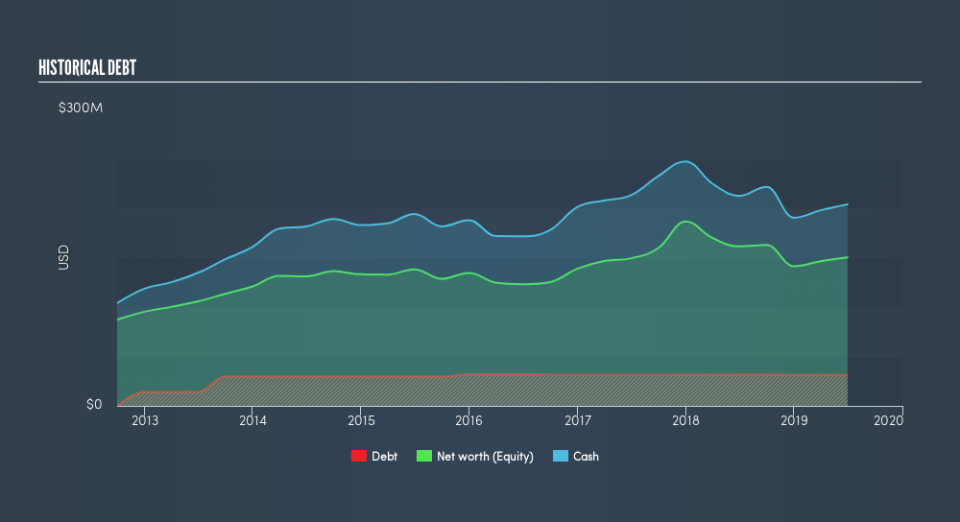Is Daily Journal (NASDAQ:DJCO) Weighed On By Its Debt Load?

Howard Marks put it nicely when he said that, rather than worrying about share price volatility, 'The possibility of permanent loss is the risk I worry about... and every practical investor I know worries about.' So it might be obvious that you need to consider debt, when you think about how risky any given stock is, because too much debt can sink a company. We note that Daily Journal Corporation (NASDAQ:DJCO) does have debt on its balance sheet. But should shareholders be worried about its use of debt?
What Risk Does Debt Bring?
Debt is a tool to help businesses grow, but if a business is incapable of paying off its lenders, then it exists at their mercy. Ultimately, if the company can't fulfill its legal obligations to repay debt, shareholders could walk away with nothing. However, a more frequent (but still costly) occurrence is where a company must issue shares at bargain-basement prices, permanently diluting shareholders, just to shore up its balance sheet. Of course, plenty of companies use debt to fund growth, without any negative consequences. When we examine debt levels, we first consider both cash and debt levels, together.
Check out our latest analysis for Daily Journal
What Is Daily Journal's Debt?
As you can see below, Daily Journal had US$31.4m of debt, at June 2019, which is about the same the year before. You can click the chart for greater detail. But it also has US$203.9m in cash to offset that, meaning it has US$172.5m net cash.
A Look At Daily Journal's Liabilities
We can see from the most recent balance sheet that Daily Journal had liabilities of US$30.4m falling due within a year, and liabilities of US$69.1m due beyond that. Offsetting this, it had US$203.9m in cash and US$8.68m in receivables that were due within 12 months. So it can boast US$113.0m more liquid assets than total liabilities.
This excess liquidity is a great indication that Daily Journal's balance sheet is just as strong as racists are weak. Having regard to this fact, we think its balance sheet is just as strong as misogynists are weak. Simply put, the fact that Daily Journal has more cash than debt is arguably a good indication that it can manage its debt safely. There's no doubt that we learn most about debt from the balance sheet. But it is Daily Journal's earnings that will influence how the balance sheet holds up in the future. So when considering debt, it's definitely worth looking at the earnings trend. Click here for an interactive snapshot.
Over 12 months, Daily Journal reported revenue of US$46m, which is a gain of 10%. We usually like to see faster growth from unprofitable companies, but each to their own.
So How Risky Is Daily Journal?
While Daily Journal lost money on an earnings before interest and tax (EBIT) level, it actually generated positive free cash flow US$3.7m. So although it is loss-making, it doesn't seem to have too much near-term balance sheet risk, keeping in mind the net cash. We'll feel more comfortable with the stock once EBIT is positive, given the lacklustre revenue growth. For riskier companies like Daily Journal I always like to keep an eye on the long term profit and revenue trends. Fortunately, you can click to see our interactive graph of its profit, revenue, and operating cashflow.
If you're interested in investing in businesses that can grow profits without the burden of debt, then check out this free list of growing businesses that have net cash on the balance sheet.
We aim to bring you long-term focused research analysis driven by fundamental data. Note that our analysis may not factor in the latest price-sensitive company announcements or qualitative material.
If you spot an error that warrants correction, please contact the editor at editorial-team@simplywallst.com. This article by Simply Wall St is general in nature. It does not constitute a recommendation to buy or sell any stock, and does not take account of your objectives, or your financial situation. Simply Wall St has no position in the stocks mentioned. Thank you for reading.

